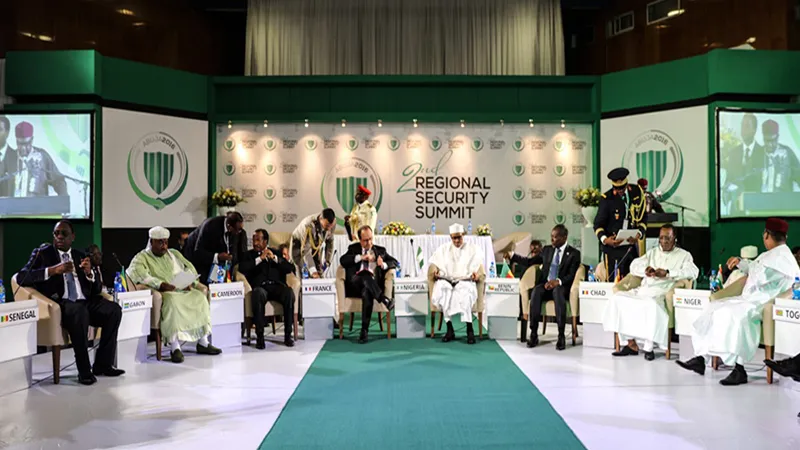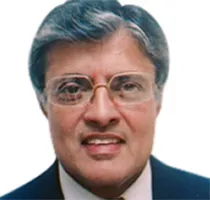-
CENTRES
Progammes & Centres
Location

It is strange that the Second Regional Security Summit in Abuja (Nigeria) on May 14 received only low profile media coverage. Considering the fact that fundamentalist Islamic terrorism is the single most important threat facing most of Africa today, one would have expected a greater degree of interest and debate on the event. This, however, does not diminish the significance of the Summit. The event may not have come out with game changing decisions and strategies, but it certainly helped to keep terrorism in West and Central Africa in the lime-light. The message that unless it is tackled urgently, it could easily spread to other regions came out strongly.
One would recall that the first edition of this was hosted by the French President, Francois Holland in Paris in May 2014. That was held in the aftermath of the crisis in Mali where more than half the country was over-run by Islamic terrorists. It took several months of sustained action by troops from some of the West African states and the French forces to restore order in the country. The increasing danger from such terrorist groups began to be taken seriously by France and EU. The stabilisation of Mali did not end the problem. Actually, the number of attacks in the West African region has steadily increased. To add to the complexity of the problem, a variety of terrorist groups have sprung up in the region owing allegiance to different international terror organisations. Some of them are: Ansar Dine in Mali and Al Shabab in Somalia linked to the Al Qaida in the Islamic Maghreb (AQIM) and the ruthless Boko Haram in Nigeria linked to the IS or Daesh. It now calls itself the Islamic State West Africa Province (ISWAP). There are others like MUJAO whose loyalties are not clear. All these groups are fighting for the limited “terror space” in the region. Since their finances, arms supplies and recruitment capabilities depend on their visibility and credibility, there is an unholy competition in the brutality and the high profile nature of the attacks to attract greater attention with the hope of more patronage from AQIM or IS. The attacks in the last six months in Bamako (Mali), Ouagadougou (Burkina Faso), Grand Bassam (Cote d’ Ivoire) and several others in Nigeria are evidence to this phenomenon.
It was in this grim situation that the Summit in Abuja was held. It was attended by Niger, Chad, Benin and France at the President’s level and UK at the Foreign Minister level. While high-lighting the grave situation, the Summit identified Boko Haram as the most important priority. Since his take over as the President of Nigeria, Muhamadu Buhari has revamped the operations against Boko Haram. However, the success has been limited. Suicide bombings are still a regular feature not only in North Eastern Nigeria, but also, in places like Abuja. The group’s activities have spread to neighbouring countries namely Chad and Cameroon.
One important decision after the 2014 Summit was to create a new Multi National Joint Task Force (MNJTF) for the Lake Chad Basin Commission States (Nigeria, Niger, Chad, Cameroon and Benin). The old MNJTF set up in 1994 was totally ineffective due to political tensions between the states. The new Force of 7,500 troops with its Head Quarters in N’Djamena, capital of Chad, achieved some impressive gains. Nigerian forces helped by those from Chad and Cameroon were able to recover most of the territories taken over by Boko Haram over a period of time and push them deep into the Sambisa forest on the border with Cameroon. Further success by MNJTF was hampered by many factors. Shortages of finances and equipment are a serious problem. Nigeria, which is the main driver of the force has complained that the other countries should step up their financial contributions. The Nigerian Foreign Minister, Geoffrey Oyema said in a press conference that the burden of running MNJTF rests primarily on Nigeria. There have also been operational issues. The Chadian forces which operated inside Nigeria with the latter’s permission achieved spectacular success in the beginning causing considerable embarrassment to the larger and better equipped Nigerian army. There were also allegations of diversion of funds meant to fight Boko Haram for the personal gains of some Nigerian Army generals. Attempts by Nigeria to dominate the operational aspects of MNJTF may prove counter- productive.
 Protest against the Boko Haram in Paris, 2015
Protest against the Boko Haram in Paris, 2015One theme that came out clearly from the Summit is that Libya holds the key to the success or failure of Boko Haram. The group’s steadfast allegiance to Al Baghdadi of IS notwithstanding, direct material and personnel assistance from the Middle East can only be limited due to the distance and logistical hurdles. That is where Libya becomes a critical link. From the thousands of fighters of IS in the lawless parts of Libya like Sirte, a large number are easily able to reach north east Nigeria, Chad and Cameroon with arms and explosives. The conclusion was that unless order is restored in Libya, Boko Haram will continue to grow. It is encouraging that EU is taking the threat of Boko Haram seriously. The EU High Representative Federica Mogherini confirmed that €50 million have been set aside for MNJTF. It is not an impressive contribution, but one hopes that it is a beginning for future involvements.
The Summit is but one step in dealing with Boko Haram. It is still very much a Nigeria based terror group. The political will and the implementation capability of the Nigerian government are the critical elements to a solution. So far, Buhari’s efforts have been generally appreciated. He has to stay the course till the end.
The views expressed above belong to the author(s). ORF research and analyses now available on Telegram! Click here to access our curated content — blogs, longforms and interviews.

H.H.S. Viswanathan was a Distinguished Fellow at ORF and a member of the Indian Foreign Service for 34 years. He has a long and diverse ...
Read More +